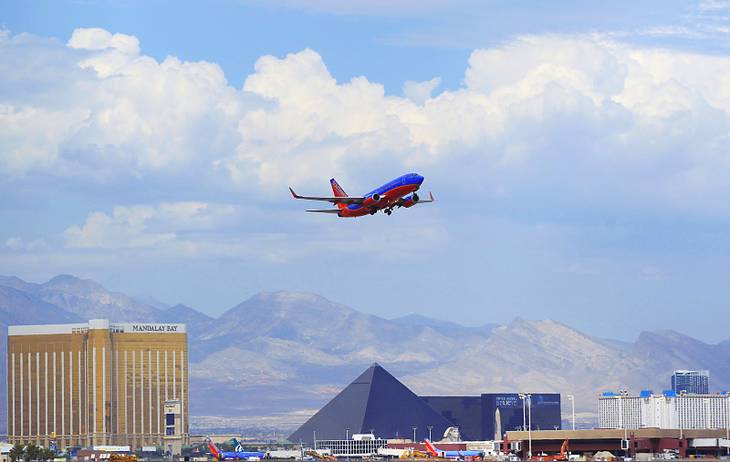Sun coverage
Executives with Dallas-based Southwest Airlines, McCarran International Airport's busiest air carrier, blamed an increase in fuel costs and bad fuel-hedging bets for a rare loss reported by the company today.
Southwest, which has an average of 215 flights a day at McCarran and commands a 42 percent market share on the number of seats to the market, reported a loss of $140 million, 18 cents a share, on revenue of $4.3 billion for the quarter that ended Sept. 30.
In the same quarter in 2010, the airline reported earnings of $205 million, 27 cents a share, on revenue of $3.19 billion.
Southwest had record third-quarter operating revenue, yields, passenger enplanements and load factors, but was on the wrong side of a fuel-hedge agreement, paying a higher price in advance of the quarter.
The airline has had a history of successful fuel hedges, or buying fuel on speculation.
Southwest and other airlines are implementing fare increases during the holiday season to counteract surging fuel costs.
“Our business has been quite good, but we will plan cautiously,” Southwest CEO Gary Kelly said. “We’re not hitting profitability forecasts because of fuel costs, so we are keeping a close eye on that.”
Kelly said booking trends remained strong for the airline.
Chief Financial Officer Laura Wright said two-thirds of the company’s growth for the quarter involved the airline’s additional revenue from AirTran, a Florida-based airline Southwest acquired for $1 billion. The deal closed in May.
Southwest is working to integrate AirTran, a process expected to continue through the first half of next year. One of the benefits Southwest is getting in the AirTran deal is a presence at Hartsfield-Jackson Atlanta International Airport, the largest major city it doesn’t serve.
Southwest will begin flying to Atlanta in February and will begin operating one non-stop round trip a day between Las Vegas and Atlanta beginning March 10.
Kelly said Southwest would continue its “Bags Fly Free” policy despite AirTran delivering about $200 million in bag fee revenue. The company believes it can generate more business and customer loyalty by not charging it.
Kelly said the airline’s plan to integrate Boeing 737-800 jets into its fleet is on target, and Southwest will take delivery of its first planes early next year. Kelly said the planes, which have a capacity of 175 passengers instead of the 138 most of the other planes in the fleet hold, would be used on some Las Vegas routes.
Kelly said the larger planes would have Boeing’s “sky interior,” which includes more overhead bin space for carry on bags. He said the company’s first look at the new interiors had the executives considering placing them in the rest of the fleet.
Southwest continues to drive revenue with its revamped Rapid Rewards loyalty card and branded credit cards, as well as its Early Bird early boarding and Business Select programs.
Wright said Rapid Rewards added $55 million, while Business Select — a premium service with such features as early boarding privileges and free drinks — netted $22 million for the quarter. Early Bird, a $10-per-flight charge that enables passengers a better place in line when boarding passes are available, has generated $106 million in three quarters. The company projected making $100 million for the whole year.
